When we first started exploring SMS notifications, we were surprised by how much customers preferred text updates over emails.
After adding Twilio across various online stores, we’ve seen consistent improvements in customer satisfaction and fewer support requests.
The challenge most store owners face isn’t understanding the value of SMS notifications – it’s figuring out how to set them up without hiring a developer.
Through years of helping WooCommerce users, we have simplified the process into easy-to-follow steps that anyone can handle.
In this guide, we’ll show you how to integrate Twilio SMS notifications with your WooCommerce store.
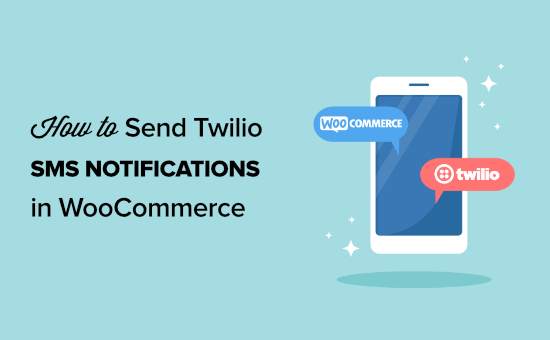
Why Add SMS Notifications to WooCommerce?
SMS notifications are the best way to give your customers information about their orders. Text messages are highly personal, and they are usually seen and opened within seconds of arriving on the person’s phone.
You can use SMS notifications to give your customers updates about their orders, such as order confirmation and shipping messages.
SMS notifications are also a creative way to encourage your audience to visit your store and buy more products. For example, you might use SMS messages to send coupon codes or remind them about abandoned carts.
With that in mind, we’ll show you how you can send WooCommerce SMS using Twilio. You can use these quick links to navigate through the steps:
- Step 1: Set up Your Twilio SMS Account
- Step 2: Install and Activate Uncanny Automator
- Step 3: Connect Twilio and Create a New Automation Recipe
- Step 4: Configure the WooCommerce Trigger
- Step 5: Set Up the Twilio SMS Action
- Bonus Tip: Use SMS Marketing to Build Customer Relationships
- Frequently Asked Questions About WooCommerce SMS Notifications
Let’s get started!
Step 1: Set up Your Twilio SMS Account
The first thing you’ll need is a Twilio account.
Twilio is an online service that offers phone, voice messaging, and SMS services that can be used with applications like WordPress and WooCommerce.
Twilio has a free trial, so you can set up your account and try the service for free. To start, you’ll want to head over to the Twilio website and click on ‘Start for free.’

On the signup page, you’ll be asked to enter your personal information to set up your Twilio credentials.
Then, you’ll need to verify your email address and phone number.
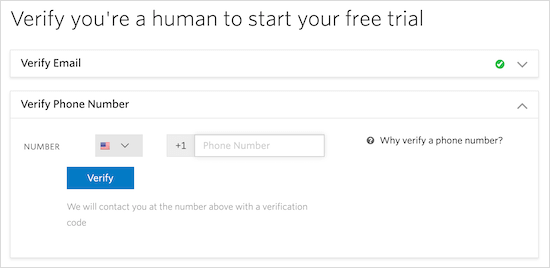
Next, select the product you want to use, what you plan to do with it, and what organization you will use it for.
This tutorial will cover ‘SMS,’ ‘Alerts & Notifications,’ and ‘Sole proprietor / Self-employed.’
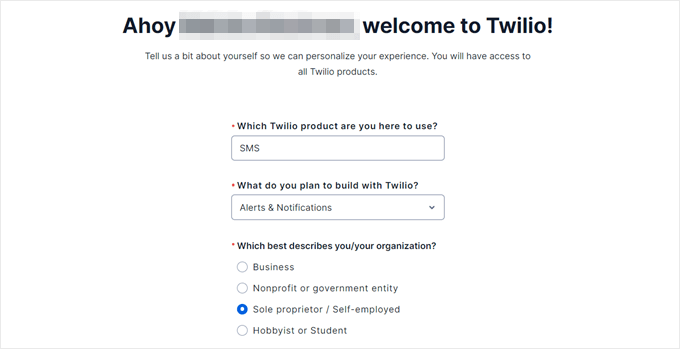
Once you enter your information, you can scroll down and select ‘With no code at all.’
Then, go ahead and click ‘Get Started with Twilio.’
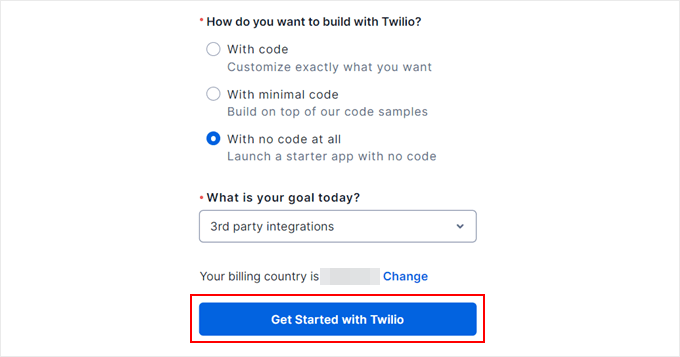
After you sign up for an account, you’ll be taken to the Twilio dashboard.
To get a phone number for your account, you’ll need to click the ‘Get phone number’ button.
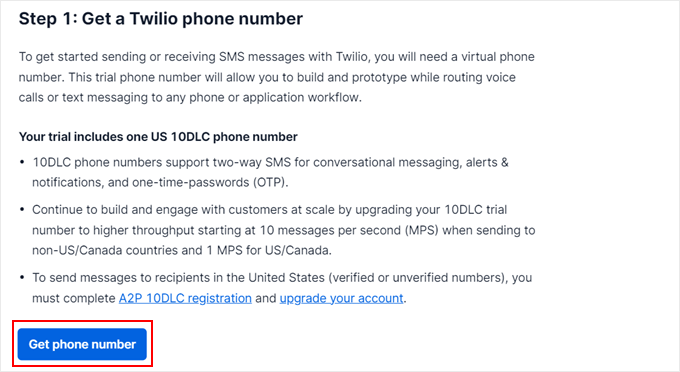
Now, you’ll want to scroll down to the ‘Account Info’ section.
Your account SID, auth token, and new Twilio number will be listed here. You’ll need this information later, so you might want to keep this tab open.
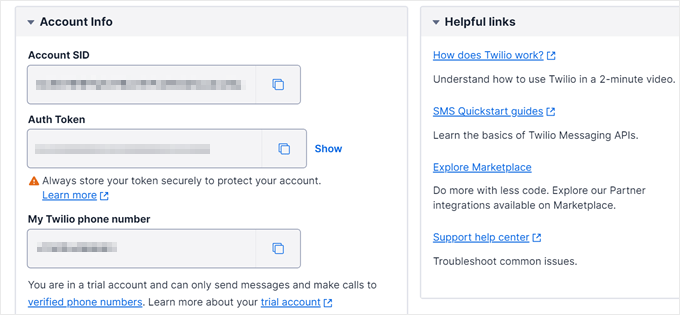
Step 2: Install and Activate Uncanny Automator
While there are many WooCommerce extensions you can use to connect Twilio with WooCommerce, the best method we’ve tried so far is using an automation plugin.
This plugin will connect Twilio and WooCommerce. It will then automatically notify Twilio to send WooCommerce SMS messages whenever there is a certain activity happening on your online store.
Uncanny Automator is the best WordPress automation plugin on the market. It lets you create powerful workflows to save time and reduce errors without writing any code.

We have thoroughly tested it and it seamlessly integrates with several WordPress plugins and third-party tools. For more information about the tool, you can see our complete Uncanny Automator review.
Think of it like Zapier but for WordPress websites.
For this tutorial, you will need the Pro Uncanny Automator plugin, as it lets you connect with WooCommerce. While the free Uncanny Automator plugin allows Twilio integration, you cannot connect it with WooCommerce.
If you need help with plugin installation, please see our guide on how to install a WordPress plugin.
Then, you’ll want to follow through with our guide on how to create automated workflows in WordPress with Uncanny Automator.
Step 3: Connect Twilio and Create a New Automation Recipe
Uncanny Automator works by creating ‘recipes,’ which are simple automated workflows.
Every recipe has at least two parts: a ‘Trigger,’ which is the event that starts the automation, and an ‘Action,’ which is the task that gets performed.
Upon activating Uncanny Automator, you’re ready to set up a recipe. But first, you’ll need to connect your Twilio account to the plugin To do that, go to Automator » App integrations.
In the left-hand menu, select ‘Twilio.’ You can now enter your ‘Account SID,’ ‘Auth token,’ and Twilio ‘Active number.’
After entering the details, go ahead and click the ‘Connect Twilio account’ button.
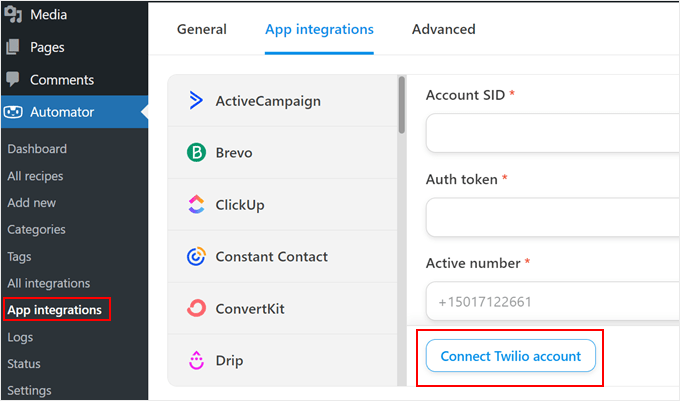
Then, you’ll need to navigate to Automator » Add new.
Here, you’ll be asked to choose ‘Logged-in users’ or ‘Everyone.’ We are going to select ‘Everyone’ so all shoppers will get an SMS notification, even if they checkout with a guest account.
With that done, go ahead and click on ‘Confirm.’
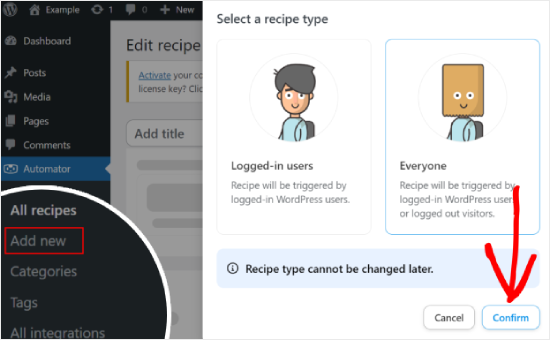
Next, you can name your recipe by typing into the ‘Title’ field. This is just for your reference, so you can use anything you want.
Step 4: Configure the WooCommerce Trigger
After that, you’ll click on ‘WooCommerce’ in the ‘Select an integration’ area.
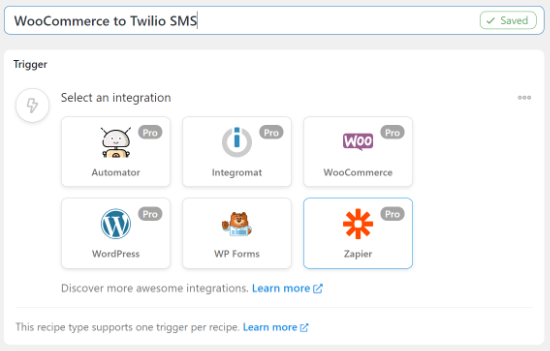
Now, you can choose your trigger, which is anything that kickstarts the recipe.
In the dropdown menu, let’s select the following option: ‘A guest completes, pays for, lands on a thank you page….’
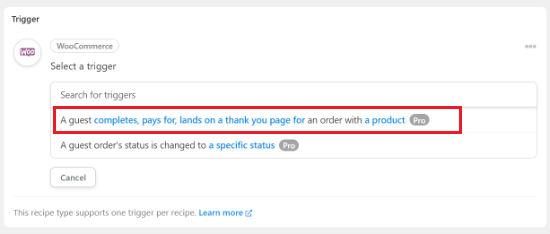
Next, you’ll need to open the ‘Trigger condition’ dropdown and select ‘completes,’ so the workflow will run every time a customer completes a purchase.
Don’t forget to click on ‘Save.’
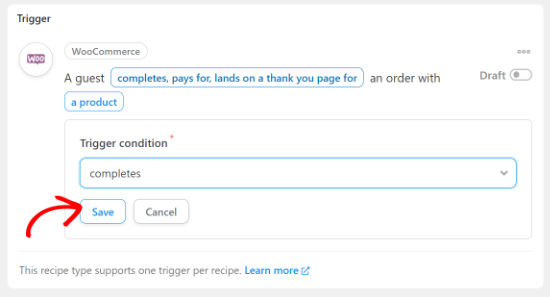
Next, you can link this recipe to a specific product.
We want to run the recipe when a customer buys any product, so you’ll want to select ‘Any product’ from the dropdown and then click ‘Save.’
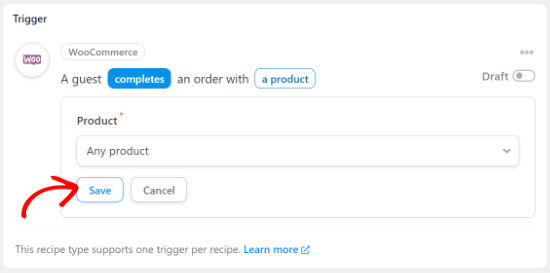
Step 5: Set Up the Twilio SMS Action
Uncanny Automator will now save your trigger, and you can move on to the ‘Actions’ section.
Here, let’s click the ‘Add action’ button to get started.
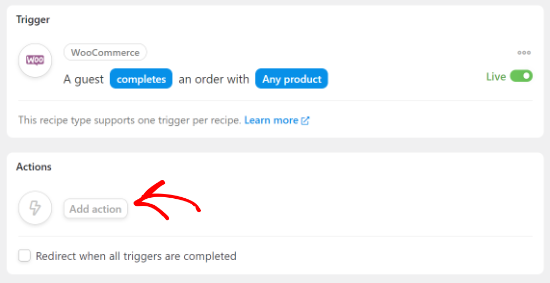
You will now see all of Uncanny Automator’s integrations, such as ActiveCampaign and Instagram.
In this section, you’ll want to click on ‘Automator.’
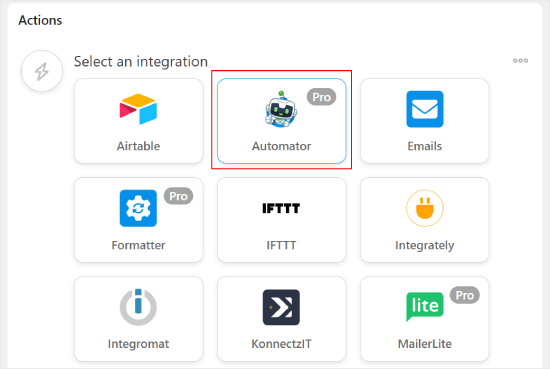
The next step is to select an action from the dropdown.
You can go ahead and choose the ‘Call a custom function/method’ option.
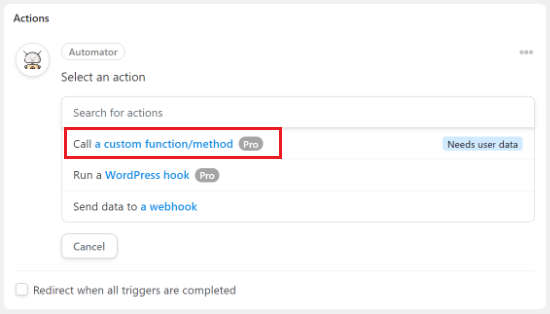
To start, let’s type in a name for the custom function that you want to create.
It can be something like ‘sms_notification.’
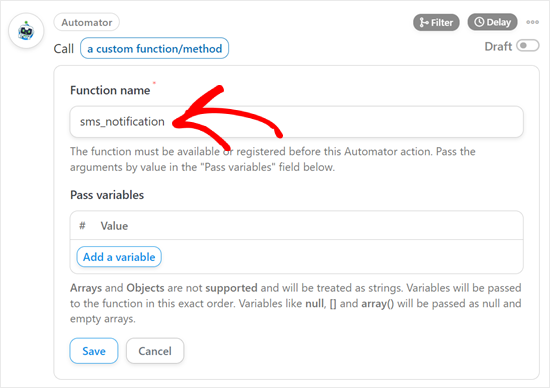
Then, you can click on ‘Add a variable.’
Now, click on the asterisk ‘*’ sign next to the empty field to specify all the data you want to use in your recipe.
In the search bar, you’ll type in ‘Billing first name’ and select it when it appears. This allows you to use the customer’s first name in your recipe.

Once you’ve done that, go ahead and click on ‘Save.’
Now, you’ll click the ‘Add action’ button again and select the ‘Twilio’ integration.
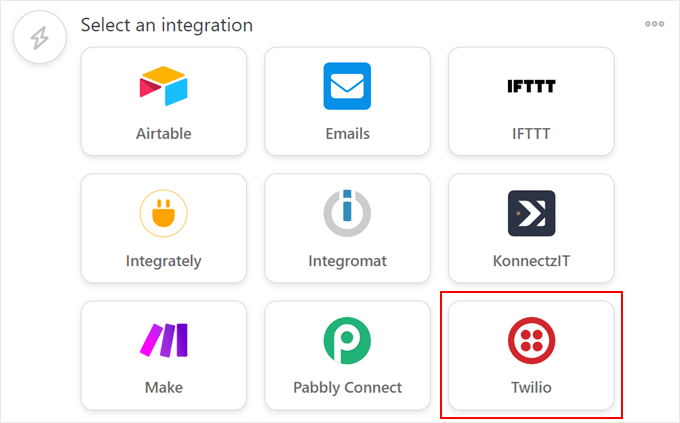
From the dropdown menu, simply select ‘Send an SMS message to a number.’
This will bring up a new box where you can add the ‘To’ address and the ‘Body’ of your SMS.
In the ‘To’ field, you can click the asterisk ‘*’ button and select ‘Billing phone’ from the dropdown list.
Then, it’s time for you to create the text message that will be sent to customers within the ‘Body’ section. Feel free to add data from the asterisk ‘*’ button to insert the shopper’s order information, such as the total price and delivery date.
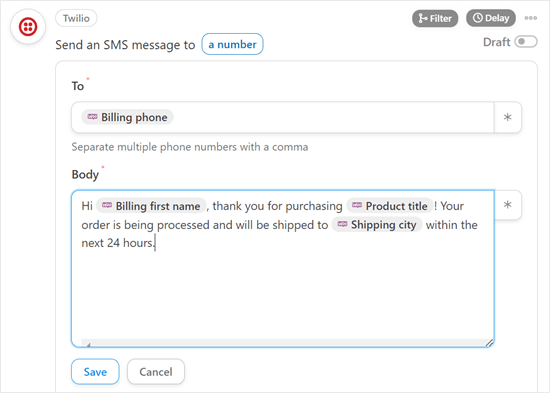
When you are happy with your message, just click on ‘Save.’
Now, you can navigate to the ‘Recipe’ box and click the ‘Draft’ switch so that it shows ‘Live’ instead.
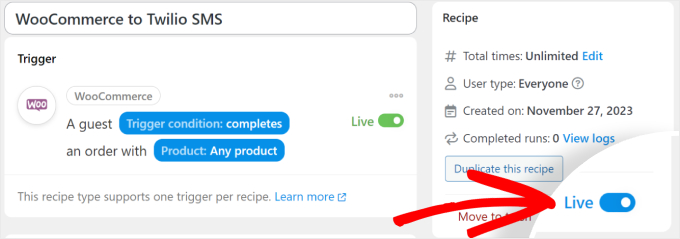
Your recipe is now live, and Uncanny Automator will automatically send SMS notifications to your customers using Twilio every time they make a purchase.
Bonus Tip: Use SMS Marketing to Build Customer Relationships
Sending Twilio SMS notifications from your WooCommerce store is just the beginning of SMS marketing. To take things further, we recommend using dedicated marketing tools.
For example, OptinMonster is excellent for capturing phone numbers from website visitors using popups and forms. Then, a service like Nextiva can be used for managing contacts and sending bulk SMS marketing campaigns.
SMS marketing is more than just order notifications. It can grow your customer relationships by informing buyers about upcoming discounts and sending out feedback surveys to improve their shopping experience.

To implement SMS marketing on your WooCommerce store, you can check out our list of the best SMS marketing plugins on the market.
Frequently Asked Questions About WooCommerce SMS Notifications
Here are some questions that our readers frequently ask about sending WooCommerce SMS notifications to customers:
How much does it cost to send WooCommerce SMS notifications?
Twilio charges per message, and typical rates range from about $0.0075 per SMS in the U.S. to around $0.02–$0.07 in many Latin American countries. Uncanny Automator Pro is a yearly subscription, and Twilio also includes a small free trial balance so you can test everything before paying.
Can I send other types of WooCommerce notifications?
Yes. You can trigger SMS messages for almost any WooCommerce event, including shipped orders, new accounts, or abandoned carts. As long as WooCommerce tracks the action, you can create an automation for it.
Can customers reply to the SMS messages I send through Twilio?
Not with the basic setup. These SMS alerts are one-way only unless you build a more advanced integration to handle incoming messages.
Do I need a developer to set up WooCommerce SMS notifications?
No. With tools like Uncanny Automator and Twilio, you can set up SMS alerts without writing any code. The process is guided through simple forms and dropdown menus inside your WordPress dashboard.
Can I send SMS notifications to international customers?
Yes. Twilio supports sending messages to most countries, and WooCommerce will automatically pass the customer’s phone number to the automation. Just be aware that international SMS rates vary by region.
We hope this article helped you learn how to send Twilio SMS notifications from WooCommerce. You may also want to see our guide on how to create an email newsletter and our expert list of the best WooCommerce points and rewards plugins for your store.
If you liked this article, then please subscribe to our YouTube Channel for WordPress video tutorials. You can also find us on Twitter and Facebook.





Mrteesurez
I am impressed with this post, Majority ecommerce platforms are not using SMS, they only depend on mails which can sometimes go the spam box or not even check by some users. Using SMS is more matured and shows the site is professional.
Thanks for sharing.